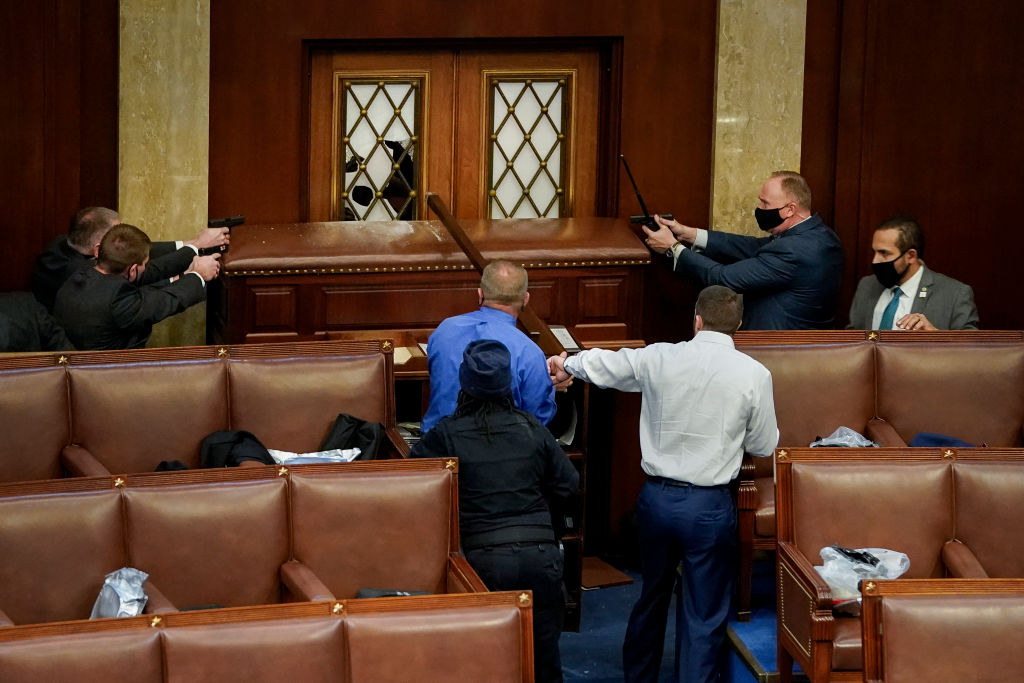Our worrying acceptance of political violence
There are plenty of good reasons to be cynical about the House January 6 Committee’s hearings scheduled for prime time this evening. The lawmakers have hired an experienced documentary maker and TV news executive to turn the committee’s work into a slick audience-friendly production. According to Axios, former ABC News president is producing the event “as if it were a blockbuster investigative special.” Meanwhile, even outlets sympathetic to the committee’s work acknowledge the electoral calculation behind the whole production. A New York Times story this week described the hearings as a chance for Democrats to “recast their midterm message.”
Leaving to one side my skepticism about the wisdom of that strategy (will January 6 crack the top ten list of voters’ concerns in November?), all of these understandable reasons to take tonight’s hearings with a pinch of salt should not be confused with a bad one: the idea that the riot perpetrated by a pro-Trump mob at the Capitol last year was no big deal. It was. Not, to be clear, as Biden has claimed, “the worst attack on our democracy since the Civil War.” But something can still be pretty bad and not meet that threshold.
Also bad: the attempted murder of a Supreme Court justice. Early Wednesday morning, Nicholas John Roske, a twenty-six-year-old Californian, was arrested and charged after being found outside Brett Kavanaugh’s house with a handgun, a knife, zip-ties and duct tape. In the end, Roske called himself in, dialing 911 and allegedly telling police that he had planned to kill Kavanaugh to give his life meaning.
These events, for all their obvious differences, are strikingly similar in the nature of their threat to American institutions: both involve the use of or attempted use of brute force to bully those working within America’s institutions. They are violence-as-veto, and they are the sort of thing that a functional political system is not supposed to get into the habit of tolerating. In both cases, senior politicians are implicated. Trump urged his supporters to march on the Capitol. In March 2020, Chuck Schumer warned Brett Kavanaugh that he would “pay the price” for overturning Roe. “You won’t know what hit you if you go forward with these awful decisions,” he said. The next day Chief Justice John Roberts warned that “threatening statements of this sort from the highest levels of government are not only inappropriate, they are dangerous.” He was right.
Thankfully, only the fringes explicitly condone the use of violence for political ends after the event. The more mainstream rabble-rousers play dumb. But what is now thoroughly and dangerously accepted is the tendency to downplay, excuse or downright ignore threats of violence or actual violence when it suits your side to do so. Remember the CNN chyron insisting on “mostly peaceful” protests juxtaposed against a building being burnt to the ground? Then there’s the groan with which any mention of January 6 is met on large swathes of the right.
An effort to murder a Supreme Court justice got only the briefest of mentions on the front page of today’s New York Times. Do you think an attempt on the life of one of Kavanaugh’s more liberal colleagues by a Trump supporter would have received the same treatment? I doubt it.
There’s a vogue for predictions about America’s divides being so severe that a second civil war is in the country’s future. I think they are overblown, but the country does seem to be getting dangerously comfortable with political violence. Less shocked by it, more accustomed to it as part of the back and forth of life in a divided country, and less ashamed about deploying your alarm selectively to suit your agenda.
*** Sign up to receive the DC Diary in your inbox on weekdays ***
What Bernie wants
One person not buying the idea that January 6 revelations, along with anger at gun control and a Supreme Court reversal of Roe, might help save the Democrats in the midterms is Bernie Sanders. The veteran leftwing senator told Politico on Tuesday that, “You really can’t win an election with a bumper sticker that says: ‘Well, we can’t do much, but the other side is worse.’”
Not that his plan sounds much better. His suggestion is… drumroll… socialism! Sanders would rather the party didn’t try and spin the president’s limited achievements but be explicit about the fact that Democrats don’t have the votes they need to pass their agenda and ask for a mandate from the people for them to do so after the midterms. Sanders is nothing if not a stubborn believer in America’s appetite for his progressive agenda. Other Democrats surely know better.
What Kennedy said
Speaking of aging Senate hardliners thinking outlandish thoughts, we present, without comment, the words of Louisiana Republican John Kennedy who, to illustrate his point about rising gas prices said it would be “cheaper to buy cocaine and just run everywhere.”
What you should be reading today
Grayson Quay: The Uvalde speech Biden should have given
Amber Athey: Of course they came for Brett Kavanaugh
Francesca Peacock: Searching for the American summer novel
Nellie Bowles, the Atlantic: How San Francisco became a failed city
Allysia Finley, Wall Street Journal: Cannabis and the violent crime surge
Miranda Devine, New York Post: Insiders say Hunter is Joe Biden’s ‘closest advisor’
Poll watch
President Biden job approval
Approve: 39.6 percent
Disapprove: 55.1 percent
Net approval: -15.5 (RCP Average)
Is the country heading in the right direction or is it on the wrong track?
Right direction: 26 percent
Wrong direction: 74 percent (Politico/Morning Consult)


















